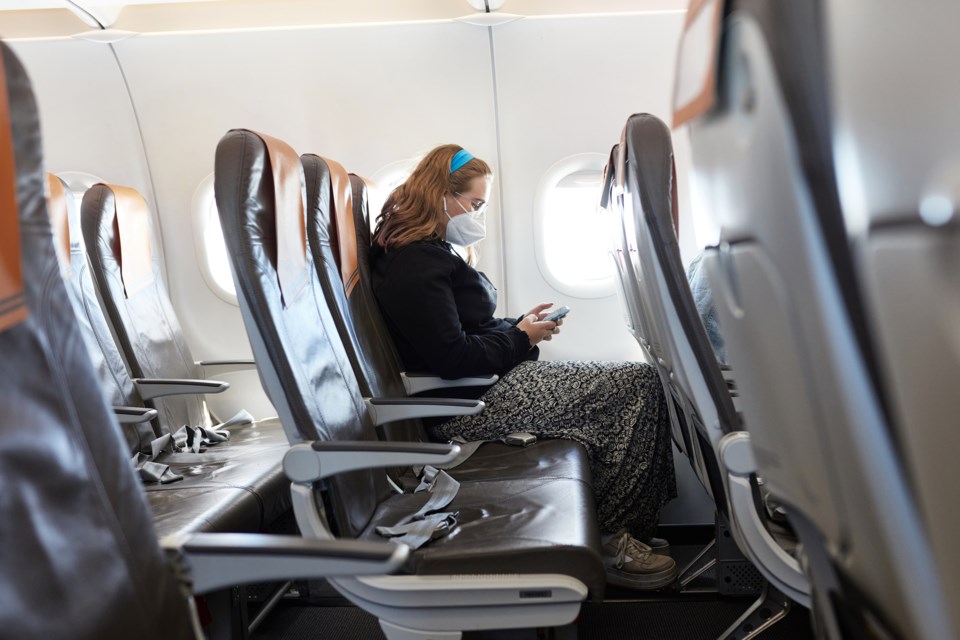The B.C. Centre for Disease Control is warning of COVID-19 exposures on 27 more flights through B.C. airports.
The flights were added to the centre’s online list of public exposures between Jan. 24 and Jan. 29. Most of the flights that were added to the list this past week are domestic, however, six are international.
The affected flights are:
- Jan. 5: Air Canada 551 from Los Angeles to Vancouver (affected rows 20 to 26)
- Jan. 14: WestJet 3170 from Kelowna to Calgary (affected rows 2 to 8)
- Jan. 15: Air Canada/Jazz 8622 from Vancouver to Winnipeg (affected rows 24 to 30)
- Jan. 17: Swoop 418 from Toronto to Kelowna (affected rows not reported)
- Jan. 18: Air Canada 115 from Toronto to Vancouver (affected rows 12 to 14)
- Jan. 18: Air Canada 254 from Vancouver to Kelowna (affected rows 19 to 25)
- Jan. 18: KLM Royal Dutch Airlines 681 from Amsterdam to Vancouver (affected rows not reported)
- Jan. 19: United Airlines 1641 from Denver to Vancouver (affected rows 27 to 33)
- Jan. 19: Air Canada 128 from Vancouver to Toronto (affected rows 1 to 4)
- Jan. 19: Air Canada 248 from Vancouver to Edmonton (affected rows 12 to 24 and 27 to 33)
- Jan. 20: Aeromexico 696 from Mexico City to Vancouver (affected rows 16 to 21 and 25 to 30)
- Jan. 20: Air Canada 215 from Calgary to Vancouver (affected rows 14 to 20)
- Jan. 20: Air Canada 234 from Vancouver to Edmonton (affected rows 12 to 17)
- Jan. 20: Air Canada 128 from Vancouver to Toronto (affected rows 30 to 36)
- Jan. 20: Air Canada/Jazz 8261 from Vancouver to Nanaimo (affected rows 3 to 9)
- Jan. 21: Air Canada 127 from Toronto to Vancouver (affected rows 38 to 44)
- Jan. 21: Air Canada 224 from Vancouver to Calgary (affected rows 12 to 17)
- Jan. 22: WestJet 141 from Edmonton to Vancouver (affected rows 14 to 20)
- Jan. 22: Air Canada/Jazz 8081 from Vancouver to Victoria (affected rows 10 to 16)
- Jan. 22: Air Canada/Jazz 8245 from Terrace to Vancouver (affected rows 8 to 14)
- Jan. 23: Air Canada 551 from Los Angeles to Vancouver (affected rows 18 to 24)
- Jan. 23: Air Canada 254 from Vancouver to Kelowna (affected rows 24 to 29)
- Jan. 24: WestJet 139 from Calgary to Vancouver (affected rows 8 to 14)
- Jan. 24: WestJet 3315 from Calgary to Comox (affected rows 3 to 9)
- Jan. 24: Aeromexico 696 from Mexico City to Vancouver (affected rows not reported)
- Jan. 24: WestJet 186 from Vancouver to Edmonton (affected rows 15 to 19)
- Jan. 26: Air Canada 255 from Kelowna to Vancouver (affected rows 20 to 26)
Passengers seated in the affected rows – listed when available – should be “considered to be at higher risk of exposure due to their proximity to the case,” according to the BCCDC.
Domestic passengers on a flight with a confirmed case of COVID-19 are advised to self-monitor for symptoms for 14 days, and get tested if any develop. While domestic travellers are not required to quarantine, health officials have been advising against non-essential travel for months.
Key symptoms to watch out for include fever or chills, cough, loss of sense of smell or taste and difficulty breathing.
Meanwhile, those arriving on flights from outside of Canada are required to isolate for 14 days under the federal Quarantine Act.
Further travel restrictions announced
On Friday, the federal government announced new rules in a bid to discourage non-essential, international travel and Canada's main airlines have agreed to suspend service to Mexico and the Caribbean.
Air Canada, Westjet, Sun Wing and Air Transat, will cancel their flights to those sun destinations beginning Sunday, Jan. 31, until April 30.
The new restrictions are aimed at stemming the spread of new variants of COVID-19.
Starting next week, international flights will also only be able to land at four airports: Vancouver, Calgary, Montreal and Toronto.
Furthermore, once they land, international travellers will be required to take a PCR test at the airport to determine if they have COVID-19. While they await their test results, they will need to wait at an approved hotel for up to three days at their own expense – which is estimated at about $2,000.
This is in addition to the pre-flight testing for international travellers put in place on Jan. 7.
In the coming weeks, non-essential travellers will also have to provide a negative test at the land border with the U.S.
Those who test negative for the virus will be allowed to quarantine at home, while those international travellers who test positive will be send to a designated government facility to quarantine.
- With files from Stefan Labbé/Tri-City News



